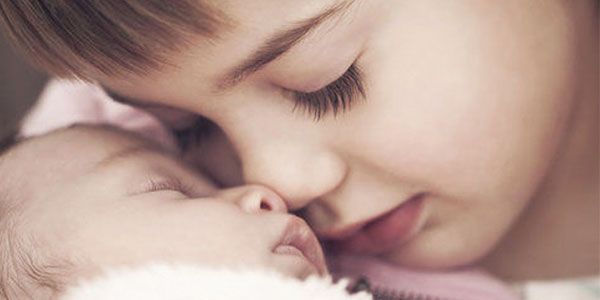
The arrival of a new family member requires an adjustment for everyone, especially for the younger family members. For parents, the reactions of the older siblings can be frustrating, and they don’t always know how to proceed. In the haste and bustle, they forget that it is normal for the other child to be jealous and look for ways to get attention. Parents should help their children learn not to be jealous as this will cause serious problems in their interpersonal relationships, at work and when dating.
What can parents do to help during this transition?
Most children get used to the idea of having a sibling. Depending on the child’s age and development level, it is recommended to tell the child that, at some point, they will have a younger sibling.
This is not the best time to make changes in the child’s routine, such as learning to go to the bathroom alone or sleep alone in his room. Otherwise, you risk that, with the arrival of the younger sibling, there will be a setback in this development. It is also not advisable to demand more than what the child can give because there is a baby on the way.
• Starting from three years-old, parents should explain to the kids about what’s happening. Try to involve the kid in the process; suggest names for the baby, help in the room decoration, feel the baby’s heartbeat, go with mom to the doctor. Of course, the level at which the older sibling can participate depends on their development and comprehension. Already at three years old, the child has an idea of the concept of family.
• Talk to the kid about when he was younger, showing him pictures and telling him what he did. A child of three or four years old understands things through concrete examples. This also allows him to know what to expect. That way, when he sees the newborn, he won’t ask you to make him walk.
• When you get home, it is a good idea that the newborn brings a present to his older sibling. This will help the older sibling to not feel jealousy. You can also ask relatives and friends not to forget to bring the older sibling a present when they go see the baby. This way, the child won’t feel that all the attention is for the younger sibling and that they have forgotten about him.
• At home, parents should make time for their oldest child. Do not change the routine too much. Mothers should reserve a special time, every day give the kid 30 minutes of attention, even if that means looking for someone to take care of the baby.
Even so, it is very possible that the sibling feels jealousy, apathy, or that he goes through a setback in his development and wants you to dress him again, give him milk in a bottle, or put diapers on him.
Be patient. Eventually, the siblings will play together and establish a relationship of love and understanding. Remember; never compare your children with one another. This unleashes pathological jealousy that last their whole lives.
La llegada de un nuevo miembro de la familia requiere un ajuste para todos, especialmente para los integrantes más jóvenes del hogar. Para los padres, las reacciones de sus hijos mayores pueden ser frustrantes y no siempre saben cómo proceder. En el ajetreo, se olvidan de que es normal que el otro niño sienta celos y que busque formas de reclamar atención. Los padres deben lograr que sus hijos aprendan a no tener celos patológicos ya que esto les creará serios problemas de relaciones interpersonales, en el trabajo y en la pareja.
¿Qué pueden hacer los padres para ayudar durante la transición?
La mayoría de los niños se acostumbra a la idea de tener un hermano. Dependiendo de la edad y del nivel del desarrollo del niño, es recomendable hablarle de que en algún momento tendrá un hermanito.
Este no es un buen momento para hacer cambios en la rutina del niño, como aprender a ir al baño solo o a dormir solo en el cuarto. De lo contrario, se arriesga a que con la llegada del hermanito haya un retroceso en este desarrollo. Tampoco es recomendable exigirle más de lo que puede dar porque viene en camino un bebé.
A partir de los tres años se les debe explicar lo que ocurre. Tratar de integrar al niño al proceso; sugerir nombres para el hermano, ayudar en la decoración del cuarto, sentir el latido del bebé, acompañar a la mamá al médico. Claro está, el nivel en que el hijo mayor puede participar depende de su desarrollo y comprensión. Ya a los tres años de edad, el niño tiene una idea del concepto de familia.
Háblale al niño de cuando era menor, mostrarle fotos y contarle lo que hacía. Un niño de tres o cuatro años entiende las cosas a través de ejemplos concretos. Además, esto le permite saber qué esperar. Así, al ver al recién nacido, no pedirá que lo pongas a caminar.
Al llegar a la casa, es una buena idea que el recién nacido le traiga un regalito a su hermano mayor. Esto ayudará a que no sienta tantos celos. También puede pedirles a los familiares y amigos que no olviden traerle algo al niño mayor cuando vayan a ver al bebé. De esta forma, el niño no sentirá que toda la atención es para el hermanito y que se han olvidado de él.
Ya en casa, los padres deben sacar tiempo para su hijo mayor. No alterar demasiado su rutina. Las mamás deben reservar un tiempo especial, todos los días dedicarle al niño 30 minutos de atención, aunque esto implique buscar a alguien que cuide al bebé.
Aún así, es muy posible que el hermano sienta celos, apatía o que experimente un retroceso en su desarrollo y quiera que lo vistan de nuevo, le den la leche en biberón o le pongan pañales.
Ten paciencia. Eventualmente, los hermanos jugarán juntos y establecerán una relación de amor y comprensión. Recuerda, nunca comparares a tus hijos. Eso desata celos patológicos para toda la vida.









